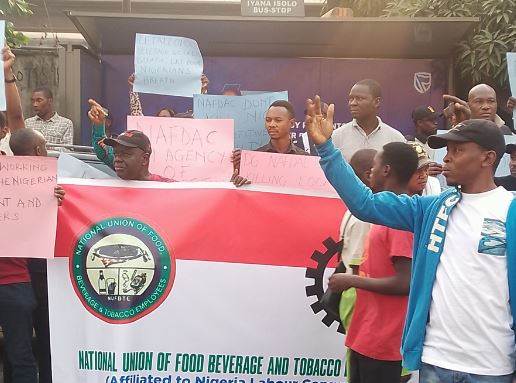
National Union of Food Beverage and Tobacco Employees (NUFBTE)
Yesterday, Feb. 6, Organised Labour, led by representatives from the Trade Union Congress (TUC) of Nigeria and the National Union of Food Beverage and Tobacco Employees (NUFBTE), staged a protest at the Lagos office of the National Agency for Food, Drug Administration and Control (NAFDAC).
The protest was against the recent ban and shutdown of production lines for companies manufacturing alcoholic drinks in sachets and small bottles below 200ml by the Federal Government.
Labour adamantly rejected the ban, citing the potential loss of over 45,000 jobs and billions of Naira in investments.
The protesting workers gathered at NAFDAC’s office on Plot 1, Industrial Estate, Apapa-Oshodi expressway, Isolo, Lagos State, displaying placards with various inscriptions expressing their grievances. One such placard read, “NAFDAC, let us breathe.”

Olamide Somefun, Vice Chairman of the Food Beverage and Tobacco Senior Staff Association in Ota, Ogun State, emphasized the jeopardy facing numerous jobs due to the ban.
He stated, “Many companies, particularly local industries supplying raw materials to producers, will likely shut down.” The protest unfolded following NAFDAC’s enforcement of the ban on February 1st, 2024, under the leadership of its director-general, Mojisola Adeyeye.
The agency had issued a five-year phase-out notice in 2019, aiming to eliminate small-sized alcoholic beverages over concerns about their accessibility to underage drinkers.
Professor Adeyeye explained during a press conference in Abuja that these pocket-friendly drinks are easily accessible and affordable, posing risks for children’s future well-being.
Despite the agency’s reasoning, NUFBTE members expressed concerns about the ban’s economic fallout, stressing its impact on numerous families’ livelihoods dependent on these industries.
The ban, agreed upon by a multi-agency committee in 2018, outlined a gradual reduction in production leading to a complete phase-out by 2024. NAFDAC reaffirmed adherence to the agreed timeline, emphasizing the non-renewal of licenses for the banned products after January 2024.
#aprokovibesng

